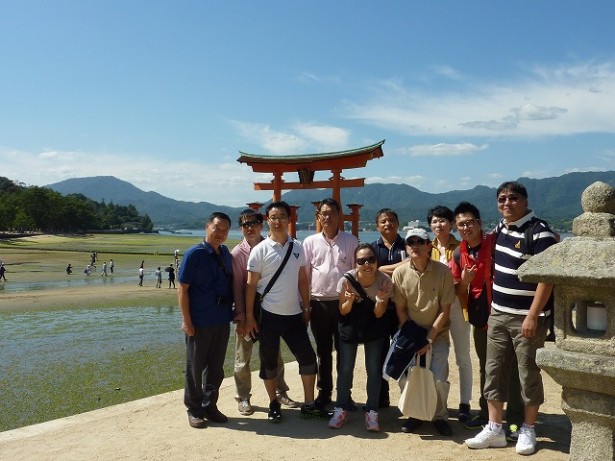Over the Years
Home > Over the Years > Over the Fiscal Years (2010 APR - 2020 MAR) > Ten Medical Professionals from Korea Invited for Training
Ten Medical Professionals from Korea Invited for Training
HICARE invited 10 medical professionals engaged in radiation emergency medicine at the Korea Institute of Radiation & Medical Sciences (KIRAMS) and hospitals designated by KIRAMS for training on the treatment of radiation disorders.
List of Trainees (10 members):
| Name | Organization | Title |
|---|---|---|
| CHOI SANG WOOK | Dongnam Inst. Of Radiological & Medical Science (DIRAMS) | Medical Doctor |
| YOON JIHAN | Seoul National University Hospital (SNUH) | Emergency Technician |
| OH HUNG SUK | Chungbuk National University Hospital (CBNUH) | Head Nurse |
| YEO DONGSUB | Busan Gijang Hospital | Administrator |
| KIM CHANGTAEK | Cheju Halla General Hospital (CHH) | Radiologist |
| LEE SANG BONG | Gyeongsang National University Hospital (GNUH) | Radiologist |
| KANG NOHYUN | Chungnam National University Hospital (CNUH) | Radiologist |
| CHOI DO CHUL | Chonbuk National University Hospital (CUH) | Technician |
| NA WONKYUNG TERESA | Korea Inst. Of Radiological & Medical Science (KIRAMS) | Researcher (MSc) |
| LEE DUCK CHANG | Korea Inst. Of Radiological & Medical Science (KIRAMS) | Administrator |
Period of Training:
September 25 to 28, 2012
Training Organizations (in order of visits):
Radiation Effects Research Foundation
Hiroshima University Hospital (Advanced Emergency and Critical Care Center)
Hiroshima University Research Institute for Radiation Biology and Medicine
Hiroshima Atomic Bomb Casualty Council
Kurakake Nozomi-en (A-bomb survivors nursing home)
Hiroshima Peace Memorial Museum and others
Training Course:
Diagnosis of radiation disorders
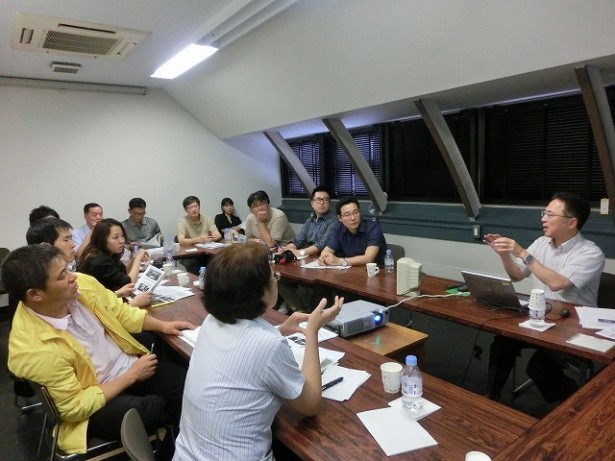
With Assistant Department Chief Tomonori Hayashi of the Department of Radiobiology/Molecular Epidemiology, Radiation Effects Research Foundation (far right)
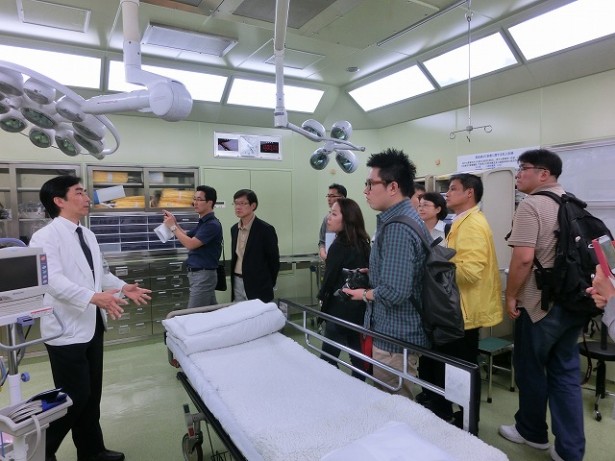
With Professor Koichi Tanigawa, Director of Advanced Emergency and Critical Care Center (far left)
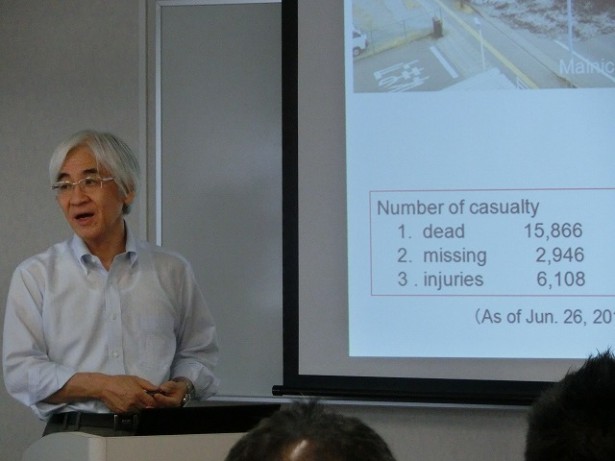
Training session of Dr. Kenji Kamiya, Director of Hiroshima University Research Institute for Radiation Biology and Medicine
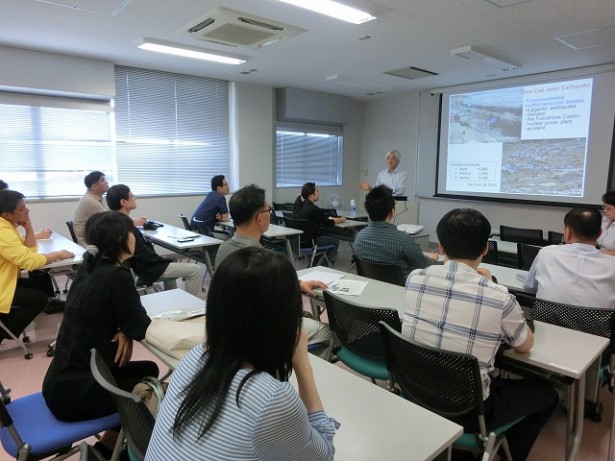
Doctors listening to the lecture of Dr. Kamiya
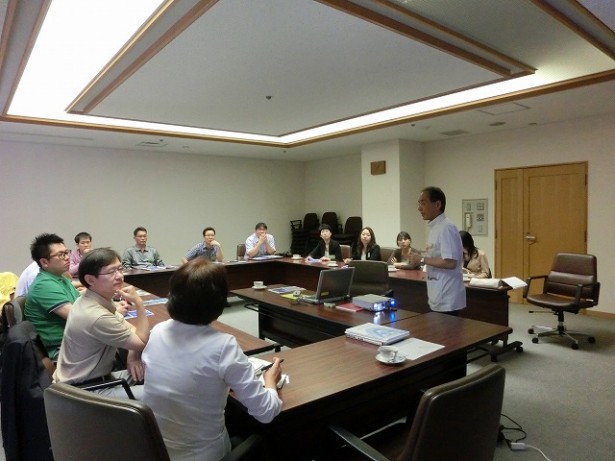
With Dr. Hideo Sasaki, Director of Health Management & Promotion Center, Hiroshima Atomic Bomb Casualty Council (far right)
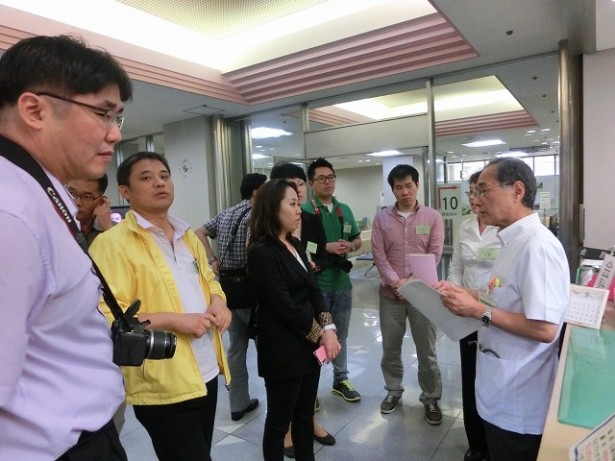
Dr. Hideo Sasaki (far right) giving an inspection tour of the facility
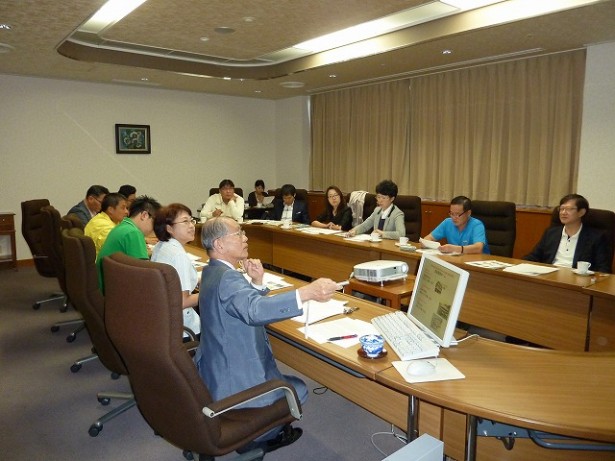
With Dr. Nanao Kamada, Board Chairman of Hiroshima A-Bomb Survivors Relief Foundation (front row)
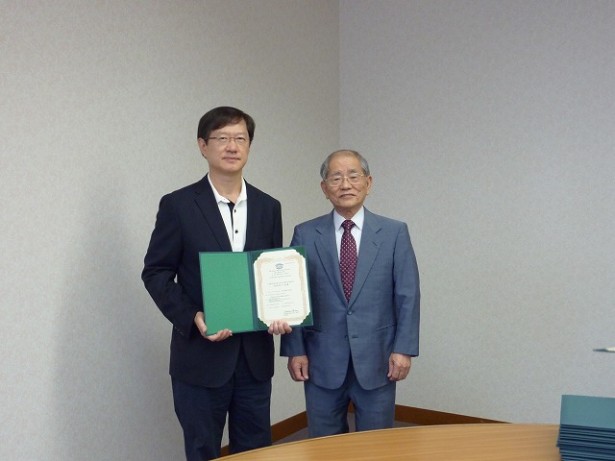
Dr. Choi, the leader of the delegates (left) receiving a certificate of completion by Dr. Nanao Kamada
Feedback:
◆In the training, I truly felt the terror of nuclear weapons by looking and experiencing what I did not know. I got to know that Hiroshima has materials and a database of A-bomb survivors based on their accumulated knowledge and utilizes them effectively for such purpose as the treatment of survivors. I hope they will continue sharing this kind of information with us.
◆I directly felt the struggle of A-bomb survivors which I only could imagine until I came to Japan. And I reconfirmed the necessity of mental health care for the survivors I have been considering adopting it for the survivors living in Korea. I will utilize the knowledge I acquired in the training as basic materials to persuade our government to develop a national system for radiation emergencies in my country.
◆I learned a lot about damage and injuries caused by the atomic bomb. I think that this is not a problem only for Japan but the rest of the world needs to understand the pain of Hiroshima and Nagasaki. I saw inhuman photos and items exhibited in the peace museum, and became fraught with emotion while imagining how hard Hiroshima people have tried to reconstruct the present peaceful and beautiful city.
◆I was impressed with the fact that Hiroshima has carried out various kinds of research on the possible diseases caused by radiation, and acquired new technology for health care of A-bomb survivors.
◆Learning about the Fukushima Nuclear Power Plant (i.e. problems of the medical support system, how to treat patients and local residents) was very helpful. I will share my new knowledge with the people in Korea and improve our readiness for nuclear disasters.
◆Nuclear energy may be necessary for man. However, if you mishandle it, what happens? I learned to be very cautious. Visiting Hiroshima gave me an opportunity to learn about the devastation after the bombing, radiation related injuries, and treatment for the injuries.
◆Thanks to HICARE Training I had a chance to think about how to respond if nuclear power plant disasters happen and how to prevent people from injuries and death. What I leaned will be very useful for building systems for any kind of disasters, including planning, training, preparing and follow-up management, especially for readiness for disasters affecting hospitals.
◆I will incorporate the acquired knowledge into education programs on protection from radiation exposure for our staff.
◆I do not know how to express our appreciation to all the doctors who kindly and diligently gave us lectures and answered our questions even when time was up.
